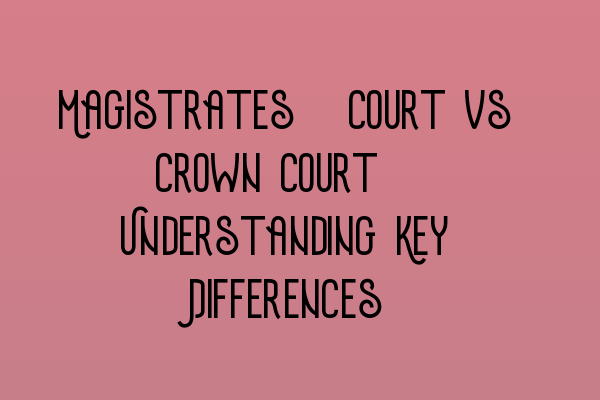Magistrates’ Court vs Crown Court: Understanding Key Differences
As a budding criminal lawyer, it’s crucial to understand the key differences between the Magistrates’ Court and the Crown Court. Each court has its own jurisdiction and processes, which can significantly impact your legal strategy and the outcome of your cases.
Magistrates’ Court
The Magistrates’ Court is the lower court in the English legal system. It deals with less serious criminal offenses, such as minor assaults, theft, and traffic violations. In these courts, cases are heard by a panel of magistrates or a district judge, who are often non-professional judges. Magistrates’ Courts aim to dispose of cases quickly and efficiently.
When a case is brought before a Magistrates’ Court, it goes through various stages, including:
- First appearance: The defendant enters their plea, and the court sets a future date for trial.
- Case management hearing: The court reviews the progress of the case and sets a timetable for further proceedings.
- Summary trial: If the defendant pleads guilty, the court proceeds to a summary trial, where the magistrates or district judge determines the sentence.
- Triable either way offenses: For more serious offenses, the Magistrates’ Court may transfer the case to the Crown Court for trial.
While the Magistrates’ Court may appear less formal than the Crown Court, it still plays a crucial role in the criminal justice system. Understanding the procedures and limitations of this court is essential for any aspiring criminal lawyer.
Crown Court
The Crown Court is the higher court where serious criminal offenses are heard. These include cases such as murder, rape, and robbery. Additionally, cases that have been transferred from the Magistrates’ Court due to their seriousness are also heard in the Crown Court.
Trials in the Crown Court are conducted before a judge and a jury of 12 members of the public. The judge is responsible for ensuring a fair trial, while the jury determines guilt or innocence based on the evidence presented in court. The Crown Court also has the authority to impose more severe sentences than the Magistrates’ Court.
It’s important to note that the Crown Court must hear cases involving indictable offenses or complex legal matters. As a criminal lawyer, you must be prepared to navigate the Crown Court’s formal procedures and present a strong case on behalf of your client.
Understanding the Differences
Now that we’ve covered the basics of both courts, let’s highlight some key differences:
- Jurisdiction: The Magistrates’ Court handles less serious offenses, while the Crown Court deals with serious crimes and appeals from the Magistrates’ Court.
- Judges: The Magistrates’ Court is presided over by magistrates or district judges, whereas the Crown Court has professional judges.
- Procedure: The Magistrates’ Court aims for efficiency and quick disposals, while the Crown Court follows a more formal trial process.
- Sentencing: The Magistrates’ Court has limited sentencing powers, while the Crown Court can impose more severe punishments.
By understanding these key differences, you can tailor your legal strategy to suit the specific court you’ll be appearing in and better serve your clients.
Conclusion
As a criminal lawyer, you’ll likely find yourself working in both the Magistrates’ Court and the Crown Court. Knowing the nuances and distinctions between these two courts is vital for your success in the field.
For more information on criminal law practice and preparing for the SQE exams, check out these related articles:
- SQE Sample Papers: Practice for Exam Success
- Focus Areas in SQE1 and SQE2: Mastering Key Concepts
- Adjusting Your SQE Strategy Based on Mock Performance
- SQE Mock Debrief Sessions: Critical Steps for Improvement
- Practicing with SQE Sample Papers: Elevating Your Scores
Remember, developing a strong understanding of the courts and the legal processes involved will pave the way to a successful career in criminal law.
